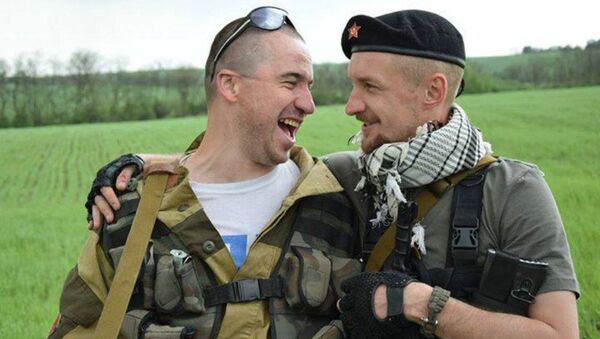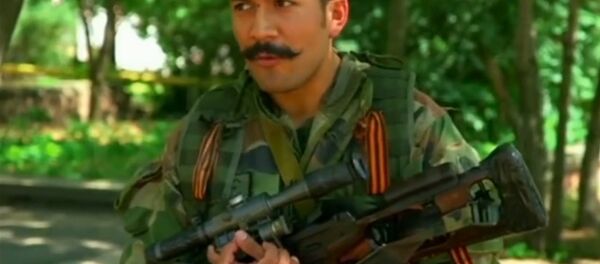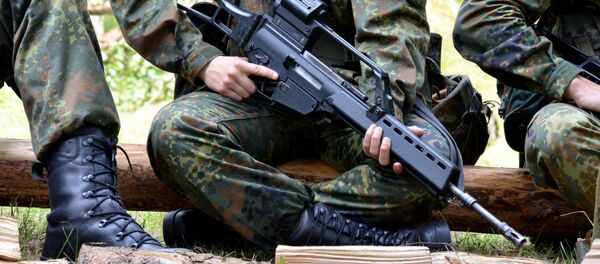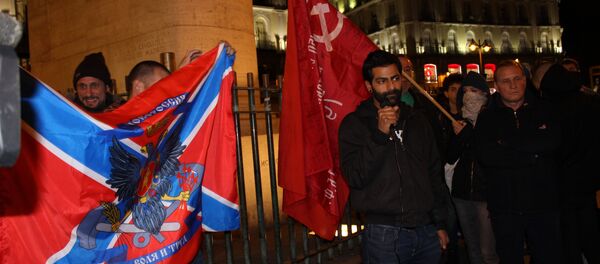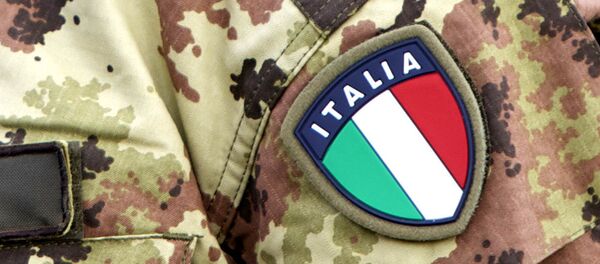The Facebook post noted that the Czech-Slovak squad, formed from the Pyatnashka 15 international brigade, already has eight members, and is looking for several more volunteers to create a 10 member squad, complete with its own badge and nomenclature. The page notes that prospective volunteers should have previous military experience, a working knowledge of Russian, be in good shape, and be under 40 years of age.
Dnesnym dnom sa zacala formovat samostatna cesko-slovenska jednotka. Pocet ludi v Patnastke zatial dostacuje na…
Posted by International Brigade 15 — Slovak page on Thursday, June 4, 2015
The Facebook post announcing the formation of the new unit.
On Monday, Slovak news site Aktuality.sk published an interview with one of the new unit's volunteers, who spoke on condition of anonymity. According to the volunteer fighter, the eight-person squad consists of four Czechs and four Slovaks, among them the famous Slovak militia commander nicknamed 'Sojka' ('The Jay') who is on leave following an injury. The other volunteers include rank-and-file troops as well as several specialists.
New Unit Does Not Include All Czech, Slovak Volunteers Serving in Donbass
The fighter explained that the unit's members have been present in Donbass since last summer, their two-company Pyatnashka unit serving under the DPR's Republican Guard, and participating in the Battle of Debaltseve between January and February 2015. Their operations included espionage and sabotage missions, and they served as a garrison force in the area until April. "During this period, we were exporting trophy ammunition from the place, repairing eliminated trophy machines, and so on," the volunteer noted. In May, the fighters were relocated to a position outside the town of Marinka, about 20 km west of Donetsk, where Ukrainian forces have recently been accused of launching a major offensive.
Asked by his interviewer whether the unit is engaged in fighting at the moment or enjoying a peaceful period, the fighter explained that "there has never been a peaceful period here and it will never come until an actual peace arrives. The exchange of fire and injuries occur on a daily basis." He clarified that his unit is considered a 'Sturm' group, "which means that we're usually sent to very hot zones, and places expected to get hot in the near future."
The volunteer explained that the new all-Czech and Slovak unit was formed out of the Pyatnashka 15, an international volunteer fighting group which initially consisted of 15 people. The group was formed in July 2014 and has since expanded.
Conditions Good, Weapons Scarce
Asked about the quality of the living conditions faced by his unit, the fighter noted that they are good, their present barracks having water, heating, and normal beds, and their soldier's wages averaging 8,000 Ukrainian hryvnia (equivalent to about $375 US) per month.
As for weapons, the fighter noted that they were "the same that the countries of the Warsaw Pact used to have. We are using trophy automatic rifles, sometimes taken from [captured] warehouses. Firearms include the Mosin Nagant [bolt-action rifle], anti-tank rifles dating back to the Second World War era, and the famous Ak-47 and Ak-74 Kalashnikov." He added that the militia also has access to PTUR anti-tank missiles and RPG-7 rocket propelled grenade launchers.
The fighter noted that the militia suffers from difficulties in obtaining weaponry. "All of our weapons are trophies. At some points, there were absurd situations in which a group of 20 people took up their positions and had to exchange weapons with the group that was being relieved."
No Need for Russian Military Involvement
Asked by his interviewer whether the rumors of the Russian army's participation in the conflict talked about in Western media were true, the fighter noted that "the Russian army doesn't need to be here. The number of volunteers is very high. Every day, the [local] admission committee accepts between five and twenty applicants who want to serve."
As for the presence of Russian army weaponry, referring back to the aforementioned small-arms supply problems, the fighter noted that "the tanks that we have are trophies, as are the BMPs [infantry fighting vehicles]. We suffer from a huge shortage of wheeled transport."
Volunteers' Motivations Vary, But Anti-EU, Anti-NATO Feelings Predominate
The Slovak fighter voiced his indignation when asked by his interviewer whether the volunteers could reconcile themselves with the idea that they were fighting for a country other than their own, noting "if we couldn't, we wouldn't be here," and adding, "And who fights for the interests of Slovakia? What are Slovakia's interests? Our country has not been a sovereign state for a very long time. In politics, we follow the dictates of Brussels; in economics, the dictates of an oligarchy. The citizen's interest simply isn't taken account of."
Both Czech and Slovak law bans military service in foreign armies, punishable by up to five years in jail, although lawyers in both countries have argued that the Donbass volunteers are not violating existing laws, given that the Donbass armed formations are not the armies of officially recognized states.
On Monday, the foreign ministries of both the Czech Republic and Slovakia commented on the local media's follow-up to the Aktuality.sk interview, saying that at the moment they had no verifiable information about the participation of their citizens in the conflict. A spokesman for the Slovak Foreign Ministry added that in the ministry's view, foreign volunteers serve to destabilize the situation and subsequently damage Slovakia's foreign policy interests.

